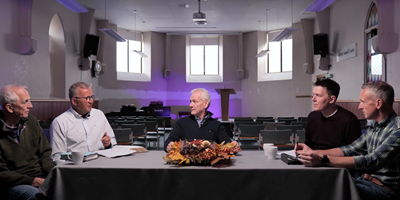A statement released on his Instagram account stated, “It is with our deepest sadness we have to announce that our baby boy has passed away. It is the greatest pain that any parents can feel . . . We are all devastated at this loss and we kindly ask for privacy at this very difficult time. Our baby boy, you are our angel. We will always love you.”
Quite rightly there has been a wave of sympathy towards the couple, as they mourn the loss of their son. The loss of a young child, even one that is still in the womb, has been experienced by many parents. It is a time of grief and it seems as though words are inadequate to bring any real comfort to those who grieve. The believer will pray for those who have been impacted that they will know the grace, comfort, strength, and peace that only God can provide.
Yet, are there any words of comfort from the Scriptures? Does the Bible give any help regarding the situation of those who die in the womb or those who die at a very young age?
My understanding is that all children who die in the womb or in infancy are saved, i.e., they are in heaven. Whilst the Scriptures are not explicit on it, I believe that it is in keeping with the whole theme of Scripture. Before I highlight how I have come to that conclusion there are some essential truths that need to be stated.
Firstly, all of us were born into the sinful line of the first man, Adam. David wrote:
“Behold, I was brought forth in iniquity, and in sin my mother conceived me” (Psalm 51:5).
Sinfulness is not a condition that comes upon us when we decide to sin but from the moment of conception sin is in our nature.
Secondly, the Bible informs us that there is a just penalty upon all sinners. All who die with their sins unforgiven will receive eternal punishment from God for their sins, including that of unbelief (Romans 6:23).
Thirdly, there are no works that we can do to merit salvation. Salvation is only possible by the grace of God, demonstrated in the death and resurrection of the Lord Jesus Christ. On the cross, Christ took upon Himself the wrath of God against sin so that all who would be “in Christ” (i.e., Christians) through repentance and believing in Him would never need to be punished because Christ took their place.
A baby in the womb or in infancy cannot believe in the Lord Jesus Christ. They have no capacity to understand the truth about God, either from natural revelation (in creation) or from special revelation (in God’s Word, the Bible). They certainly cannot understand the Gospel. This would also be the case for some of those with learning disabilities. Although Romans chapter 1 speaks of those who have never heard the Gospel being without excuse, these words are directed at those who have the ability to see and understand God’s revelation of Himself in creation. Thus those who have neither the ability to accept or reject God’s revelation do, by implication, have an excuse.
Many Bible students speak about “reaching an age of understanding or accountability” but this might be better expressed as “reaching a level of understanding or accountability”. The condition of each soul is only truly known by God but there are those who never reach that point of accountability and, based on Abraham’s rhetorical question, “Shall not the Judge of all the earth do what is just?” (Genesis 18:25 ESV), I believe that the death of Christ on the cross is effective for all of these individuals, and they go, by God’s grace, to heaven.
There are many Scriptures where God speaks graciously about those who have no knowledge of good and evil (e.g., Deuteronomy 1:39, Isaiah 7:16, Jonah 4:11). There is undoubtedly a period of life for each person during which there is no accountability, due to a lack of understanding. This is not down to the age of the person but rather to their capacity to discern and understand.
One of the clearest examples that supports the view that those who die without reaching the point of accountability go to heaven is in 2 Samuel chapter 12. The baby born out of the adulterous affair between David and Bathsheba is very unwell. David fasts and pleads with God for the child (v.16) but the child dies. To his servants’ great surprise David then arises and takes food. When they query David’s seemingly strange behaviour, he gives this response:
“But now he is dead; why should I fast? Can I bring him back again? I shall go to him, but he shall not return to me” (2 Samuel 12:23).
David, the man after God’s own heart, believed that he would eventually go to be with his infant child. The parting was only temporary. As a believer, David understood his child was in the place of eternal rest.
Contrast that confidence with David’s reaction when his rebellious adult son, Absalom, died. Absalom had sought to kill his father but instead he died first. David’s response is most instructive:
“Then the king was deeply moved, and went up to the chamber over the gate, and wept. And as he went, he said thus: "O my son Absalom—my son, my son Absalom—if only I had died in your place! O Absalom my son, my son!” (2 Samuel 18:33).
When the infant child died, David had the reassurance that, one day, he would go to be with him. When unbelieving Absalom died, David had no such assurance and wept bitterly.
If I could speak with Cristiano Ronaldo, I would express my sympathy with him in his very sad loss. The pain he and his partner are feeling will be with them for a long time. But I would also explain to him that I believe the Bible gives an assurance that his young son is, by God’s grace, in heaven. I would also affirm that he, as a person who is accountable for his sin, could one day be there with his son, through repentance towards God and faith in the Lord Jesus Christ.






























